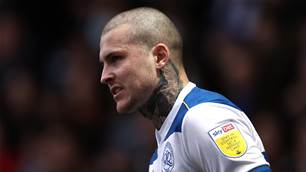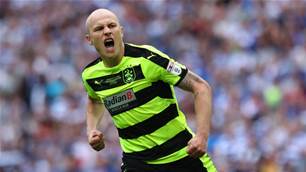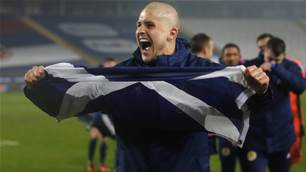The last time George Burley worked as a manager in Scotland, his record showed nine wins, two draws and one defeat in 12 games.
His spell with Hearts was short-lived after a clash with Vladimir Romanov, but if the new Scotland boss can achieve anything along the lines of that win ratio in international football then the 2010 World Cup beckons.
And if Burley takes Scotland to South Africa, then all the waiting for the appointment will have been well worth it.
But taking on the Old Firm as Hearts boss was one thing; ending Scotland's success famine on the international stage is quite another.
Burley's predecessor Alex McLeish was hailed a national hero for taking Scotland to within a whisker of the Euro 2008 finals, but ultimately France and Italy's class told over the qualifying campaign.
Burley's nephew, midfielder Craig, was Scotland's last goalscorer on the big stage, netting an equaliser in the 1-1 draw with Norway at the 1998 World Cup.
Few saw today's appointment coming. Any daring punter who backed the 51-year-old will be feeling as satisfied as Burley himself after committing to a contract which puts him in charge until 2012.
Not since Berti Vogts has the appointment of a national team coach raised so many eyebrows. Walter Smith was the popular option back in 2005, while Alex McLeish was clearly the best man for the job at this time last year.
But having fended off competition from former Rangers boss Graeme Souness, Motherwell'sMark McGhee and Celtic coach Tommy Burns, it is Burley who will be the driving force behind Scotland's quest to qualify for the 2010 finals in South Africa.
The Tartan Army will have noted Burley's obvious passion at today's press conference, held at Hampden.
They will expect to see that passion harnessed for the Scotland team's benefit as Burley now carries the hopes and ambitions of a nation upon his shoulders.
Scottish football fans will best remember Burley for his fleeting, yet exhilarating, spell as Hearts head coach in 2005.
The Edinburgh side surged to the top of the Scottish Premier League but Burley was gone within five months of his appointment.
Scottish Football Association chief executive Gordon Smith - along with president George Peat and vice-presidents Campbell Ogilvie and Alan McRae - will have delved much further into Burley's varied CV before nominating him as their preferred candidate to the SFA's 10-man board.
Born in Cumnock, Ayrshire, in 1956, Burley began his playing career as a 15-year-old apprentice at Ipswich, where he was mentored by the legendary Sir Bobby Robson and famously given the task of playing against George Best at Old Trafford in his first-team debut two years later.
An attacking full-back, Burley may have gone on to win more than his 11 Scotland caps had it not been for the talents of a certain Danny McGrain at the time.
Club football was more prosperous and 500 appearances for Ipswich yielded a 1978 FA Cup winners' medal but a knee injury robbed him of participation in the 1981 UEFA Cup success.
Coaching and management spells at Ayr United, Motherwell and Colchester followed but it was back at Portman Road that he rose to prominence as a manager.
Ipswich were all but doomed to Division One when he took over midway through the 1994-95 campaign but, after several near-misses, Burley finally steered the club back to the promised land of the Premier League.
A fifth-placed finish in 2001 and a UEFA Cup spot saw him named manager of the year by the League Managers' Association.
Burley's management career since then has had more ups and downs than a game of snakes and ladders.
Relegation and dismissal at Ipswich, a fourth-placed Championship finish with Derby and then that bizarre stint at Hearts, which leaves those in Gorgie still pondering what might have been, all feature on his record.
He leaves Southampton in 13th place in the Championship and some Saints fans have been happy to see him go.
As for his new employers at Hampden, they are convinced Burley is a natural successor to McLeish. Only time will tell if this gamble pays off, but Burley insists he cannot do the job alone.
"It's a national job, 24 hours a day and one where there is a lot of responsibility," he said.
"And it's all about results but you have to get results working hard together.
"Everybody has to knuckle down and now we've got to be really focusing and hopefully pushing all the way to the World Cup finals."
And if Burley takes Scotland to South Africa, then all the waiting for the appointment will have been well worth it.
But taking on the Old Firm as Hearts boss was one thing; ending Scotland's success famine on the international stage is quite another.
Burley's predecessor Alex McLeish was hailed a national hero for taking Scotland to within a whisker of the Euro 2008 finals, but ultimately France and Italy's class told over the qualifying campaign.
Burley's nephew, midfielder Craig, was Scotland's last goalscorer on the big stage, netting an equaliser in the 1-1 draw with Norway at the 1998 World Cup.
Few saw today's appointment coming. Any daring punter who backed the 51-year-old will be feeling as satisfied as Burley himself after committing to a contract which puts him in charge until 2012.
Not since Berti Vogts has the appointment of a national team coach raised so many eyebrows. Walter Smith was the popular option back in 2005, while Alex McLeish was clearly the best man for the job at this time last year.
But having fended off competition from former Rangers boss Graeme Souness, Motherwell'sMark McGhee and Celtic coach Tommy Burns, it is Burley who will be the driving force behind Scotland's quest to qualify for the 2010 finals in South Africa.
The Tartan Army will have noted Burley's obvious passion at today's press conference, held at Hampden.
They will expect to see that passion harnessed for the Scotland team's benefit as Burley now carries the hopes and ambitions of a nation upon his shoulders.
Scottish football fans will best remember Burley for his fleeting, yet exhilarating, spell as Hearts head coach in 2005.
The Edinburgh side surged to the top of the Scottish Premier League but Burley was gone within five months of his appointment.
Scottish Football Association chief executive Gordon Smith - along with president George Peat and vice-presidents Campbell Ogilvie and Alan McRae - will have delved much further into Burley's varied CV before nominating him as their preferred candidate to the SFA's 10-man board.
Born in Cumnock, Ayrshire, in 1956, Burley began his playing career as a 15-year-old apprentice at Ipswich, where he was mentored by the legendary Sir Bobby Robson and famously given the task of playing against George Best at Old Trafford in his first-team debut two years later.
An attacking full-back, Burley may have gone on to win more than his 11 Scotland caps had it not been for the talents of a certain Danny McGrain at the time.
Club football was more prosperous and 500 appearances for Ipswich yielded a 1978 FA Cup winners' medal but a knee injury robbed him of participation in the 1981 UEFA Cup success.
Coaching and management spells at Ayr United, Motherwell and Colchester followed but it was back at Portman Road that he rose to prominence as a manager.
Ipswich were all but doomed to Division One when he took over midway through the 1994-95 campaign but, after several near-misses, Burley finally steered the club back to the promised land of the Premier League.
A fifth-placed finish in 2001 and a UEFA Cup spot saw him named manager of the year by the League Managers' Association.
Burley's management career since then has had more ups and downs than a game of snakes and ladders.
Relegation and dismissal at Ipswich, a fourth-placed Championship finish with Derby and then that bizarre stint at Hearts, which leaves those in Gorgie still pondering what might have been, all feature on his record.
He leaves Southampton in 13th place in the Championship and some Saints fans have been happy to see him go.
As for his new employers at Hampden, they are convinced Burley is a natural successor to McLeish. Only time will tell if this gamble pays off, but Burley insists he cannot do the job alone.
"It's a national job, 24 hours a day and one where there is a lot of responsibility," he said.
"And it's all about results but you have to get results working hard together.
"Everybody has to knuckle down and now we've got to be really focusing and hopefully pushing all the way to the World Cup finals."
Copyright (c) Press Association
Related Articles

'It was a gut feeling': why Scotland star spurned Socceroos

McLeish urges Celtic to sign Socceroo: 'Did he start at Man City?'













